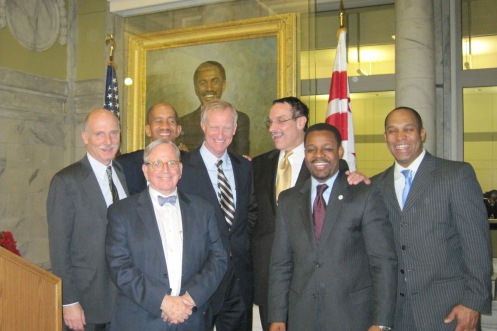On ethics, leadership needed from Evans and Graham

Last Thursday, The Georgetown Dish published an interview with Bill Lightfoot, prominent local attorney, former two-term Councilmember and currently vice chair of the Commission on Judicial Disabilities and Tenure. Among other things, he touched on the interplay of race and the ethics questions raised about a number of District elected officials. The interview was extensively quoted by Mike DeBonis in The Washington Post. Touching a sensitive nerve, Mr. Lightfoot pointed to a perception among some segments of our city that white officials are being held to a lower standard of accountability than black officials, specifically mentioning Councilmembers Jim Graham, Jack Evans and Harry Thomas. In response to a joint call from Councilmembers Evans and Graham to Mr. Lightfoot (and later calls by the Councilmembers to The Georgetown Dish and Mr. DeBonis), Mr. Lightfoot offered these additional comments: "[I make] no allegation of misconduct for Jim Graham or Jack Evans [and] I'm not comparing their conduct with that of Councilmember Thomas.” As we understand Councilmembers Evans and Graham, they say they have done no wrong and thus it is unfair and inappropriate to compare certain actions of theirs to the allegations against CouncilmemberThomas. Maybe so -- but there are questions that need answers. For Councilmember Evans, we find not illegal but certainly lacking judgment for him to use almost a third of his constituent services funds (according to The Washington Post) for sports-related activities tickets. This is not “constituent service” as most people understand it, and if it is not covered by existing law or regulation, it should be. For Councilmember Graham to claim that he behaved properly when he did not report a attempted bribe (which he rejected), or punish the staff member who made the attempt, flies in the face of common sense of how an elected official should behave. If it is not required by current D.C. or federal laws and regulations to report a bribe attempt, it should be. We have noted Mr. Graham's legal and judicial credentials in the past. He should invoke their high standard at this time for the benefit of the city. Councilmember Evans’ actions, which while questionable were undoubtedly legal, offer him a real opportunity to lead by example – and use this situation to move the District forward by advancing its ethics laws. He should announce that while he has done nothing wrong, responding to questions that have been raised about his and other Councilmembers’ funds, he is suspending all constituent fund activities until more specific standards are enacted and urges his colleagues to do the same. Indeed, he can lead on plugging other ethics loopholes, including reporting on raising and spending for legal defense funds, transitions and inaugurations and financial disclosure for Councilmembers and staff. In The Georgetown Dish, Mr. Lightfoot referred to the need for public officials to have a “moral compass” to tell them what is right and wrong in the absence of ethics laws. While it is certainly true that the questions raised about Councilmembers Graham and Evans do not rise to the level of the allegations against Councilmember Thomas (diverting to personal use thousands of public dollars intended for youth programs), lack of the former will inevitably generate cries from an angry electorate for a truckload of the latter.





